Trump's Double Toe Loop
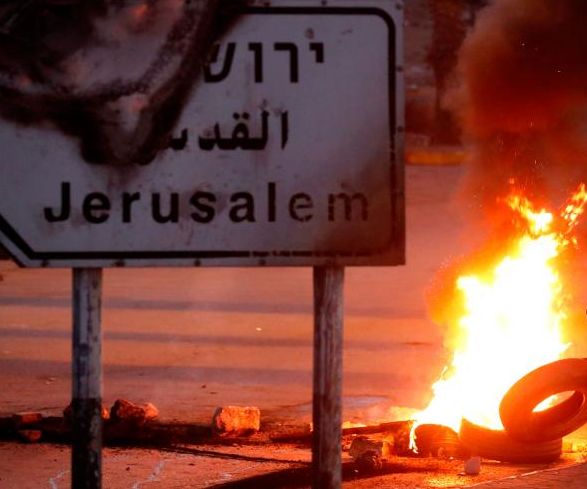
The recent decision of President Donald Trump with regard to Jerusalem is just one more surprise in the endless series of surprises in the Middle East. Numerous analysts overlook the fact that there are actually two separate parts to the decision, which has proved fateful for the Middle East. It is a double toe loop. The first part is about recognizing the whole of Jerusalem as the capital of Israel, while the second is about moving the U.S. embassy from Tel Aviv to Jerusalem. These two points are interrelated. More than this, one seems to logically stem from the other. But, as they say, opinions may differ.
While the situation in the White House has been evolving precisely in this direction ever since Trump's election, I must admit that, until the last moment, I did not want to believe that the president would take such a reckless step. There is no doubt that the move was made under the strong influence of a small group of incompetent people who determine Trump’s Middle Eastern Policy (leading U.S. experts specializing in the region that I have had a chance to talk with see them as incompetent). Their names are well known, as is the motivation behind their recommendations to the President of the United States, who quite enjoys surprising everybody. At least three of them are believed to be supporters of radical right-wing forces in Israel. Shibley Telhami, a Washington-based analyst at the Brookings Institution, wrote: “His advisors live in their own bubble, reinforced by unprecedented inexperience.” At the same time, polls indicate that 81 per cent of Americans, including 71 per cent of Republicans, would prefer Trump to rely on experts in Middle Eastern diplomacy, not inexperienced members of his family and personal lawyers.
It is true that Trump is not abandoning his policy of seeking a truce between Israel and Palestine. However, if we are to believe a leaked plan allegedly devised by Trump’s son-in-law Jared Kushner and submitted by the latter to Saudi Crown Prince Mohammad Bin Salmad Al Saud, handing East Jerusalem over to the Palestinians as the capital of their future state (which appears to be nothing more than a handful of scattered territories). It is hard to imagine any Palestinian leader agreeing to such a plan. There are far more painless and certainly less disgraceful ways to commit suicide. On the other hand, as Steven Simon, former United States National Security Council senior director for the Middle East and North Africa, states in an article for The New York Times International Edition, “For all the talk from successive administrations, a Palestinian-Israeli peace has never been a strategic imperative for Washington”.
Let us list just a few of the possible consequences of Trump’s decisions.
Trump’s decision to bury the already modest results secured by Barack Obama to improve Washington’s relations with the Islamic and Arabic worlds, shape an image of the United States that is not guided by Israel in its foreign policy and set a course that can be defined as neutral with regard to the conflict in the Middle East.
It delivers a deadly blow to the war on terror, and raises the threat of terrorist, extremist and radical religious and nationalist organizations to mobilize new supporters, with terrorists and extremists taking advantage of the desperation of the Palestinians and the fury of Muslims.
It also undermines the reputation of the United Nations, the significance of the UN Security Council’s resolutions (which were passed with the participation of the United States) and, in the broader sense, international law.
It also affects the Middle East Quartet, which was on its last legs as it was, and is now a good as dead. Any attempts to resuscitate the format would be futile. Equally irrecoverable is one of the few channels of constructive foreign political interaction between Russia and the United States. This work needs to be continued, but merely for the sake of the process. There certainly will be no results.
It also undermines the positions of the moderate Palestinian leaders, who are already having a difficult time defending their views before their more radically inclined fellow countrymen.
It also damages the reputation of the allies of the United States around the world and in the Middle East, weakening the United States’ partnership with a number of influential Islamic states – states which had until now been the country’s closest partners. We are talking primarily here about Turkey, a NATO member. The partnership will probably remain, but there will be no more trust. On December 8, Le Figaro published the following headline about Trump’s demarche: “The U.S. President isolates his country in the international arena by recognizing Jerusalem as Israel’s capital.” President of France Emmanuel Macron stated in no uncertain terms that Trump’s decision contravened the relevant UN Security Council resolutions, which does not seem to bother the President of the United States. On the contrary, he appears to derive some kind of pleasure from it. It will be difficult for the Gulf monarchies, which are closely linked to the United States and are now starting to court Israel. Jordan, which is living through difficult times of its own, appears to be in a particularly difficult situation.
Trump’s decision strengthens the positions of Iran, the exact opposite to what the President of the United States wants. We are reminded of 2003, when the United States’ invasion of Iraq made Iran the most influential external force in that country.
The decision is ruining the very concept of the Middle Eastern peace process, which contains such issues as refugees, borders and Jerusalem (the most important and difficult issue), all of which lying at the core of the talks on the so-called final status.
The wave of violence caused by Trump’s decision will be difficult to stop, as the U.S. President does not back down from his word. Anti-U.S. sentiments will continue to mount in the Islamic world, which will put the lives of American citizens at risk. The threat does not just come from the Middle East, but also from Indonesia, Pakistan, Bangladesh, etc.
Trump is doing a disservice to Israel, which needs peace with Palestine in order to secure a safe and comfortable life for its citizens.
Talking about the possible variants, some of my colleagues, the most authoritative American experts on the region, are attempting to move Trump to rectify the damage that his decision has most definitely done to the interests of the United States. In particular, Daniel Kurtzer, former U.S. ambassador to Egypt and Israel and now a professor at Princeton University, suggested in an article for the New York Daily News that Trump did not have to repeal the decision to recognize Jerusalem as the capital of Israel. All he had to do was announce that, in the future, when the plan to create two states in Palestine is implemented, he would also recognize Jerusalem as the capital of Palestine. Trump might also announce that, following the implementation of this plan, he would open a U.S. embassy to that new state in Jerusalem. It is, however, unlikely that the overconfident President will heed the voices of those naively aiming to “correct” his policy.
Why does Trump Need This? And Why is he Doing it Now?
Some believe that Trump wants to suck up to Israel’s right wing (even though much seems have already been done in that direction), and to Netanyahu in particular, who might capitalize on this and avoid prosecution. On the other hand, Trump, as people have come to believe, is primarily guided by domestic policy considerations. Polls carried out by the University of Maryland in November 2017 indicate that 59 per cent of Americans would prefer for the president to abstain from taking sides in the Israel–Palestine conflict. In addition, 57 per cent, including a majority of Republicans, believe he is leaning towards Israel. Another survey, conducted by the Brookings Institution, indicates that 63 per cent of those polled, including 44 per cent of Republicans, are against moving the U.S. embassy to Jerusalem. Even among the respondents who represent Trump’s main beacon of support in U.S. society, Evangelist Christians, only 53 per cent support the moving of the embassy, with as much as 40 per cent being against the move.
Or does he want to appease the Evangelicals? But we have already seen that not everything is clear-cut with the Evangelicals. Nevertheless, Netanyahu is targeting this segment of U.S. society. According to Steven Simon, Netanyahu believes that the next generation of Americans, or the one after that, will no longer contain liberal Jews, and that Evangelical Christians alongside Orthodox Jews will stand up to counteract America’s pressure on Israel.
Or is Trump’s idea to simply shock the international community once again, forcing it to live with any decision that may take his fancy, even the most extravagant ones?
If Netanyahu hopes that the common interest of Israel and Saudi Arabia to restrain Iran will force King Salman of Saudi Arabia and Crown Prince Mohammad to reconcile with the fact that all hopes have been lost for retaining Muslim control over at least some part of the third most significant city in the country (after Mecca and Medina), he is obviously wrong. Israel, and the United States in particular, have always underestimated the central place the Jerusalem issue takes in the eyes of Muslims. It is true that the Saudi Arabian rulers currently view Iran as a greater problem for themselves and the region than the Israel–Palestine conflict. However, the Saudi leader cannot possibly lose Jerusalem. James Dorsey, a well-known Singapore-based expert on the Middle East, believes that Mr. Trump’s recognition and any plan to grant Israel full control of Jerusalem would see the genie turning on the kingdom and its ruling family
It appears that the events in the region are giving Russia a window of opportunity just in time to revitalize the country’s weighted and respectful attitude towards all of its Middle Eastern partners and highlight its role as a unique mediator in conflicts.
They say that an experienced figure skater can do a double toe loop easily. Could the same be said of the President of the United States?
Article published in RIAC: http://russiancouncil.ru/analytics-and-comments/analytics/dvoynoy-tulup-trampa/
Фото: REUTERS/Goran Tomasevic
My Jerusalem
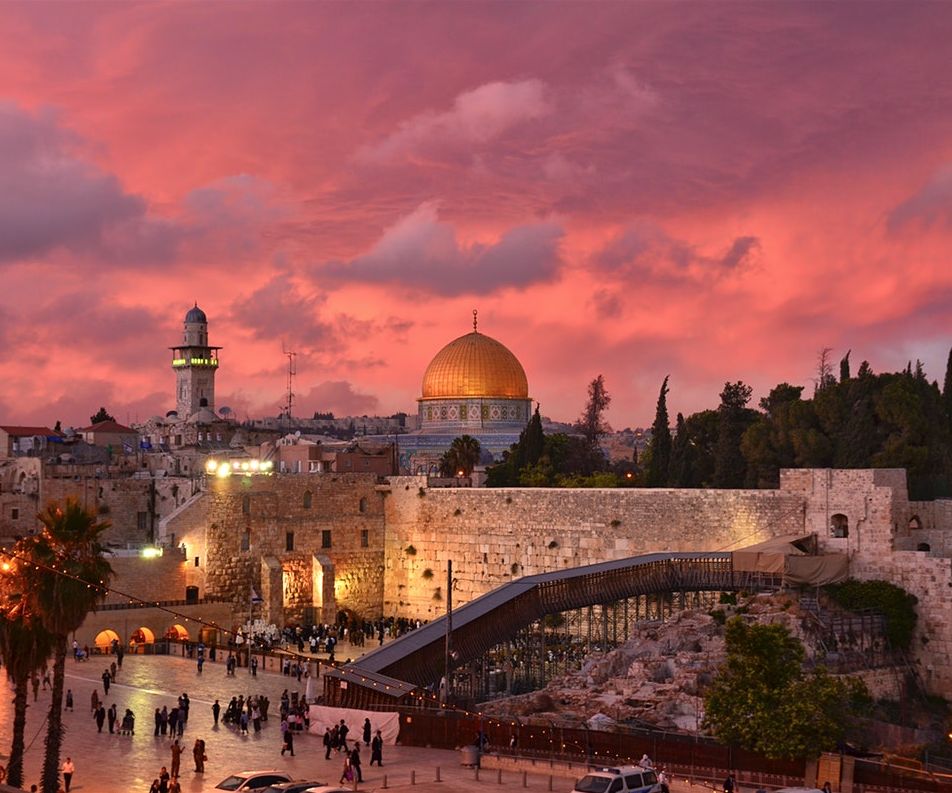 An essay published by our member Walid Salem in 2014, which gets particular sharpness in the context of current events regarding situation in Jerusalem.
An essay published by our member Walid Salem in 2014, which gets particular sharpness in the context of current events regarding situation in Jerusalem.
Jerusalem that looks to be more as if it is the ownership of the Israelis and the internationals, either living in it, or talking about it from outside. What it is represent for me as a Palestinian Jerusalemite?. Why I am also excluded not only when it comes to my rights to the city, and my rights in the city, but also excluded from my right of representing it. In the ground as many Palestinian Jerusalemites, I have a demolition order to my house since 2002, and as many others a new road that links between two settlements in East Jerusalem started to be created passing exactly at the entrance of my house in Shuafat.
This is just a minor example of the deprivation of the Palestinian Jerusalemites rights in the city.
But also I have no right to the city, I am not allowed to make a political claim that East Jerusalem is mine, something that the international community organizations in the city is adapting with, by avoiding to take actions that make Israel angry of them in the city. Thirdly I have no right to represent my self politically. In the legal level I am obliged to be defined as" A Jordanian Citizen residing Permanently in Israel", as the Israeli authorities define my status, then I am an alien in my city, cannot claim it, and as a" Jordanian" living in Israel as the say, I have to respect the generosity of the Israel of allowing me to live in an "Israeli" territory that was annexed to Israel in 1967.
Therefore also I have no right to represent my self administratively, and also in the community level. In this level my Arab Municipality was dissolved by the Israeli Authorities in 1967, then I was obliged to deal with an Israeli municipality that do not represent me. Such a municipality imposed on me its community centers that it established inside my communities, and made it the address for providing services to me. These are just examples, and there are many others, while my presence in my city faces several complex challenges, that are: first: Jewdization of the land, the place, the space, and the landscape. Second: Israelization of the Institutions by obliging me to deal only with Israeli organizations for the services, while closing the Palestinian organizations and delegitimize any link between those existing and the Palestinian authority. Third: Ethnic cleansing by using different methods of evacuating me to out of my city. Fourth: Isolation of those who will stay in the city after all of this by disconnecting the Palestinian neighborhoods in the city from each other, therefore I will need to pass through a Jewish"neighborhood", when I need to move from one Palestinian neighborhood to another. In addition to that the isolation of houses in each Palestinian neighborhood by creating Jewish enclaves inside these neighborhoods such as in the Old City and Silwan. Fifth and last: The closure started in 1993 by checkpoints and permits system, and ended with the creation of a separation wall, aiming to disconnect between the Palestinian Jerusalemites themselves and not only between the Jerusalemites and West Bank Palestinians. Needless to say that the Jerusalemites are also not allowed to travel to Gaza. These policies were not possible to pass without resistance from the Jerusalemites. In this regard Jerusalem continued to be the Center of the Palestinian national leadership from 1967 till 1994. Then the period 1994 to 2001 witnessed a division of leadership between Jerusalem and Ramallah. After the death of Faisal Husseini in 2001,the leadership moved fully to Ramallah. Nowadays one can see in the city new grassroots leadership that replaced the old leadership of notables that came to its end after the death of the last notable leader Faisal Al Husseini in the year 2001. None of the existing personalities was able to fill the vacuum created after Faisal Husseini death, also Ramallah leadership did not want that to happen, and more importantly the Israeli iron hand against any Palestinian leadership in the city prevented a new central leadership to emerge after Faisal passed away,but since life cannot live with a vacuum, the absence of Faisal was replaced by a new type of collective leadership if you like to call it represented by local community leaders who acquired legitimacy in their communities through their accumulative actions for the benefit of their communities. During Faisal Al Husseini period there were a central institution of leadership that gathered around a charismatic leader. After Faisal Al Husseini we started to see the dispersement of the leadership to the communities, in one hand this means that we came to a situation of more participation, but in other hand the leadership was localized, and the Central Jerusalem leadership was lost. The Jerusalemite other personalities failed to replace Faisal Husseini after his death, therefore they lost legitimacy, or at least they have less and less legitimacy than the communities new emerging leaders, but they still in the other hand have a wealth of knowledge and experience that it is very important that they present it to the communities leaders. These old version leaders are still also those of loud voice with the international community and with the donors while their local basis of legitimacy is diminishing. The conclusion about them is then that they are not any more the personalities that can develop a new leadership to Jerusalem( this task already went to the community leaders), but certainly these still can play the role of the advisors by their knowledge and experience to the community leaders.
The community new leaders are (the Building track) for any new central Palestinian leadership in Jerusalem, while the personalities and the NGO,s are the Supporting Track , and we should not confuse between them, their roles, and the level of importance of each one of them.
While the first track of the community leaders is ready to launch, the second of personalities is in disarray, is fully fragmented, full of competitions,parallel work and other diseases beyond their high knowledge and expertize. The international donors policies help to develop and sustain these aspects of behavior, something to be clarified in another article
Another important part of the issue of legitimacy and leadership in the city of Jerusalem, has to do with other two components: the first represented by the children of Jerusalem of 7 to 12 years old, who found themselves with the continuous ongoing humiliation and with insecurity, mainly after the kidnapping and the cruel killing of their mate Mohammed Abu Khdeir and other events that followed. These children are the main actors in the nights clashes that goes on every day in the East Jerusalem communities since the brutal killing of Mohammed Abu Khdeir.
The other component to be taken in consideration there is the Islamic component, as it express itself by the intensive involvement of the Northern part of the Islamic movement inside Israel in defending Al Aqsa against the Israeli right wing extreme groups against it , something that will lead to a religious war, starting with reaction of anger like those three of killing Israelis by running over them in the last month. These events and others alike might grow if the attacks on Al Aqsa mosque continue.
The explanation above , can provide you with the basic analysis that can help you ( and also help us), to understand the situation in Jerusalem these days. Since 2000 Intifada the situation in the city started to become bigger than the capabilities of the individual charismatic leaders to control. New local leaders start to emerge, now with the accumulation of oppression some of them started already to move to violence. Therefore it is essential to find themYESTERDAY non violent methods and representative
bodies to express themselves, and therefore containing the move to violent methods of expressing themselves. We should started this yesterday, but the lack of enough well in our side, and the hesitations in the international community resulted from the political hesitation , or from the inability to understand.
Trump's declaration and the Palestinian response
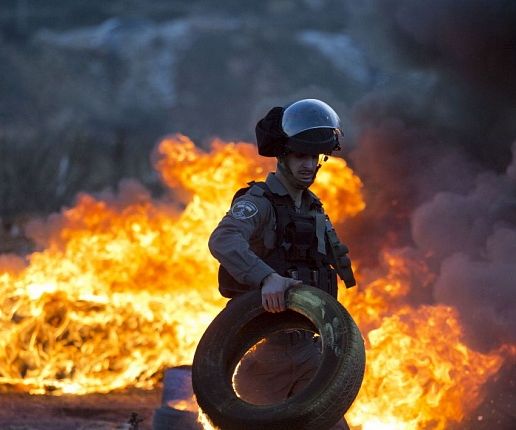 December 9, 2017 was the 30th year anniversary of the first Intifada. So far, the Palestinian responses of yesterday took three tracks: Diplomatic, nonviolent, and violent. Here is a description of each, and I will close with some conclusions.
December 9, 2017 was the 30th year anniversary of the first Intifada. So far, the Palestinian responses of yesterday took three tracks: Diplomatic, nonviolent, and violent. Here is a description of each, and I will close with some conclusions.
The diplomatic track included two crucial steps that were taken immediately: One is cutting the relations with the US administration, and the declaration by Azzam Al Ahmad, member of the central committee of Fateh, that President Abbas will not meet Mike Pence on December 19 in Bethlehem as was scheduled. The second was about submitting a complaint to the UN Security Council by the PLO Mission to the UN against the USA. It is said that point 3 of the article number 27 of the UN Security Council does not allow the USA to use the veto right against a complaint submitted against it. It is also said that nevertheless if the veto will be used, then the next step will be about going to the UN General Assembly to make a resolution under the “United for Peace” clause, which will be an obligatory resolution.
The nonviolent track expressed itself through the hundreds of demonstrations that took place yesterday in East Jerusalem, West Bank and Gaza Strip.
At the same time rockets were launched to Israel from Gaza, this time by Al Qaida and ISIS-affiliated groups. Hamas called for an Intifada without defining clearly its tools, while the Islamic Jihad and the PFLP called for struggle against the Israeli occupation by all means.
These three tracks have the following significance:
The new diplomatic track of cutting contacts with the Americans, if it continues, will mean the end of counting on negotiations as the path to the Palestinian statehood, and going instead to the path of popular resistance (as it was called by Jibril Rajoub in his recent interview with Al Arabiyya), and motivating the Arab world and the international community to take steps against the Israeli occupation and to pressure the United States by using all the diplomatic and the legal means in that direction.
The nonviolent track will be, like it or not, confused with the violent ones. The reasons for this confusion is manifold. In this regard, they are not only about the inability of the Palestinian young people to be fully rational when they are in a mood of rage and anger, but there is something deeper that has to do with the full collapse of trust in the political process of negotiations and its bitter harvest over the last 26 years since the Madrid Conference. Accordingly, it is time for the political leadership to plan and lead a full and continuous nonviolent campaign.
In order for the leadership to be able to convince its people to do so, it will need international support by giving it some concrete results to present to its people, such as more recognitions for the Palestinian State, building Palestinian facts on the ground in area C and East Jerusalem, rebuilding Gaza, creating free access between Gaza and West Bank, and finally taking care of the dignity of the Palestinian refugees until their right of return issue is solved. The non-achievement of these steps will create the conditions that are conducive to growth of violent extremist groups in both West Bank and Gaza, and the Palestinian refugee camps in the Arab neighbouring countries as well.
Article published in Valdai club: http://valdaiclub.com/a/highlights/trump-declaration-and-the-palestinian-response/
How Trump’s decision on Jerusalem can give momentum to Palestinian statehood
 President Trump’s recent decision to recognize Jerusalem as the capital of Israel, and to move the American Embassy from Tel Aviv to Jerusalem represents a crucial change in the American policy. This change can be described as a shift from the previous biased mediator position to the new position of the partner of Israel in its plans towards the Palestinians.
President Trump’s recent decision to recognize Jerusalem as the capital of Israel, and to move the American Embassy from Tel Aviv to Jerusalem represents a crucial change in the American policy. This change can be described as a shift from the previous biased mediator position to the new position of the partner of Israel in its plans towards the Palestinians.
This shift is not only a violation of the international law and the UN resolutions regarding Jerusalem, but also a violation of the 1993 Declaration of principles, signed in the White House and known as the Oslo Accords. According to that Agreement (Article 5), Jerusalem as a whole, including its East and West parts, will be subject to negotiations between the two sides. The agreement also warned against any procedures to be taken unilatarely in a way that would prejudice against the permanent status issues including Jerusalem. President Trump unilaterally decided to go beyond this Oslo commitment and to recognize Jerusalem as the capital of Israel before an agreement about its borders and its division between the two sides. This is a crucial violation.
Process-wise, this move to unilateralism goes against the multilateral/international concerted efforts to solve the Israeli-Palestinian conflict. As such, it will give the Israeli government additional motives to increase its unilateral steps to change the landscape of Jerusalem in a way that will leave no place and no space for the East Jerusalem Palestinians in the city. They will face more and more ethnic cleansing and forced migration. Different means will be used in this regard such as evacuation of the Bedouin neighborhoods around Jerusalem, ousting Palestinian communities from the city (such as Kufur Aqab, and Shufat Refugee camps), and identity cards confiscation.
The response to this American move might take one of two shapes: the first is to give President Trump a chance to develop the “ultimate deal” and present it to the parties in the coming months. Those who adopt such a position say that President Trump referred in his speech to the two-states solution, the preparation for the deal, and that the borders of Israeli sovereignty over Jerusalem will be decided by negotiations. That is in addition to his call for preservation of the status of the Holy places in Jerusalem.
The second argues that the hopes on the Americans to present a solution is over after 26 years of trial and error in the negotiations since Madrid 1991 conference till today. As such, this response calls for adoption of another path: to get to the Palestinian State in the 1967 borders and with East Jerusalem as its capital. It includes creating a Palestinian nonviolent campaign for independence, establishing Palestinian facts on the ground, especially in area C, Gaza and East Jerusalem, linking Gaza and West Bank together, promoting the Palestinian people’s unity, stuggling for more international recognition of the State of Palestine, and suing occupation in international courts.
The second looks to be a path for the creation of a new momentum towards Palestinian statehood. It advocates that the Palestinians should start this path, and then to ask the international community to support it as a path to their national emancipation.
As such, the second position argues the hit can be transformed into an opportunity for the Palestinians to get their right of self-determination in their independent state.
Article published in Valdai Club: http://valdaiclub.com/a/highlights/trump-s-decision-on-jerusalem/
Photo credit: Mohammed Zaatari/AP
Shehab Al Makahleh: Trump's decision will have a very negative effect on the peace process
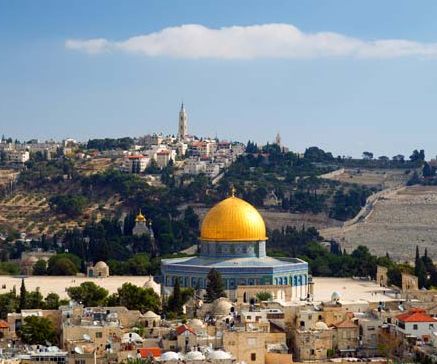
In today’s speech president Trump announced his decision to move the American embassy from Tel Aviv to Jerusalem without giving details about to which part of Jerusalem, but it is expected to be moved to East Jerusalem. His declaration that Jerusalem is the capital of Israel will have a very negative effect on the peace process, and may even freeze it for the time being, opening the gates for extremists and radicals who will start working underground and even openly. They will be having hubs and will be harbored by many people. In the past they were working secretly and now they will be overtly operating against American and Israeli interests throughout the world. This deal between the Americans and Israel could not happen without an Arab approval of what is called the “Big Deal”, which means that the Palestinians would be having their own capital in Abu Dis, which is located near Jerusalem city. This could not have happened without this kind of deal, without some Arabs. The Palestinians will not be having their own independent state, which they were dreaming of in 1995 when they signed Oslo agreement. Back then the White House already believed that Jerusalem is the capital of Israel, even though the other presidents of the US did not have the courage to announce it since then. But Donald Trump announced it without even thinking of any consequences and repercussions that would happen. That is why before he announced it, he asked the military, American Marines, to be ready for any outcome that would take place in the Middle East or anywhere in the world.
Photo credit: Renewer/Fotolia
Alexander Aksenenok: there's absolutely no logic in Trump's decision on Jerusalem
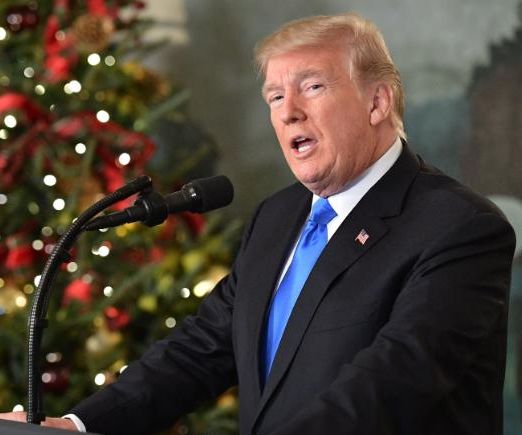 Trump occupies his post for already a year and during this time his Middle-Eastern politics has become an object of heated criticism from active and retired diplomats, Middle-Eastern experts and political scientists. There is even an opinion that Trump, unfortunately, listens more to his relatives, so it is unclear where the White House ends and where Trump’s family begins. He listens more to the opinions of unqualified people on the Middle East, than to the experienced diplomats. Moreover, the situation in the Department of State remains rather volatile. Despite one year has already passed, many offices remain unoccupied and Tillerson prefers a rather authoritarian mode of management, without listening to the Middle-Eastern specialists. At the same time there are several points of disagreement between Tillerson and Trump on the Middle East, which have become public.
Trump occupies his post for already a year and during this time his Middle-Eastern politics has become an object of heated criticism from active and retired diplomats, Middle-Eastern experts and political scientists. There is even an opinion that Trump, unfortunately, listens more to his relatives, so it is unclear where the White House ends and where Trump’s family begins. He listens more to the opinions of unqualified people on the Middle East, than to the experienced diplomats. Moreover, the situation in the Department of State remains rather volatile. Despite one year has already passed, many offices remain unoccupied and Tillerson prefers a rather authoritarian mode of management, without listening to the Middle-Eastern specialists. At the same time there are several points of disagreement between Tillerson and Trump on the Middle East, which have become public.
Speaking about this very decision, now I can say that there is absolutely no logic in it. Even from the point of view of the US national interests in the region. There is an opinion that many of Trump’s advisers have planted in his mind an idea that now the situation in the Arab world has changed so much that the Arab states do not pay attention to the Palestinian issue and that his decision to move the embassy to Jerusalem or to recognize this city as Israel’s capital will not provoke backlash in the Arab world. He thinks that maybe Arabs will have some minor protests, but not like in the 50ies and 60ies. Probably, such thoughts made Trump pass such decision. But there is absolutely not logic in it, and the reaction of Arab states, even of Saudi Arabia that now established special relations with Israel, of Iraq, Egypt, of European states like France, is naturally negative and will complicate the resolution of many other regional issues. This will hamper Trumps policy not only in the Palestinian-Israeli dimension, but also in Europe and in the Islamic world as a whole.
Photo credit Mandel Ngan/AFP
An international led process to two states solution is badly needed
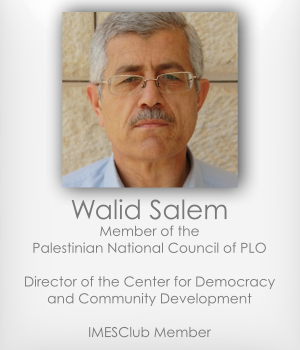 Any serious analysis of the Palestinian-Israeli conflict subsequent to the Israeli elections of the 17th of March, will not take the results of those elections as a point of departure, as if these results represent a starting point for a new path. The " new" path was there all the while since the Israeli occupation started in 1967, and ever since one can witness a process of colonization that went on systematically, regardless of the party that was ruling Israel.
Any serious analysis of the Palestinian-Israeli conflict subsequent to the Israeli elections of the 17th of March, will not take the results of those elections as a point of departure, as if these results represent a starting point for a new path. The " new" path was there all the while since the Israeli occupation started in 1967, and ever since one can witness a process of colonization that went on systematically, regardless of the party that was ruling Israel.incentives to be provided to the Palestinians to the effect of accepting Palestine as a full-member to the UN. Additionally, to allow Palestinian reconciliation to be implemented, build Gaza, and create Palestinian facts on the ground in East Jerusalem and Area C of West Bank, and the linking of the West Bank and Gaza; moreover, the tasks of the Quartet office in Jerusalem to be transformed to be equipped with such transformative tasks that will create a symmetry in the ground between the two sides of the conflict.











